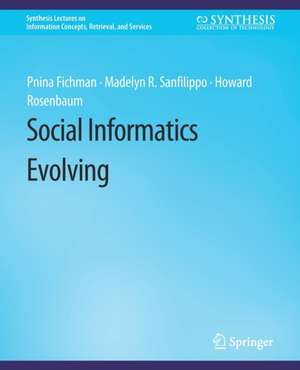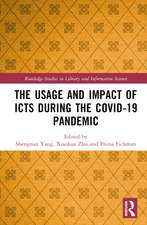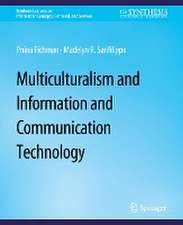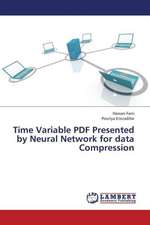Social Informatics Evolving: Synthesis Lectures on Information Concepts, Retrieval, and Services
Autor Pnina Fichman, Madelyn R. Sanfilippo, Howard Rosenbaumen Limba Engleză Paperback – 16 sep 2015
Din seria Synthesis Lectures on Information Concepts, Retrieval, and Services
- 20%
 Preț: 167.70 lei
Preț: 167.70 lei - 20%
 Preț: 301.96 lei
Preț: 301.96 lei - 20%
 Preț: 165.96 lei
Preț: 165.96 lei - 20%
 Preț: 278.44 lei
Preț: 278.44 lei - 20%
 Preț: 529.64 lei
Preț: 529.64 lei - 20%
 Preț: 276.80 lei
Preț: 276.80 lei - 20%
 Preț: 224.97 lei
Preț: 224.97 lei - 20%
 Preț: 165.44 lei
Preț: 165.44 lei - 20%
 Preț: 177.81 lei
Preț: 177.81 lei - 20%
 Preț: 358.95 lei
Preț: 358.95 lei - 20%
 Preț: 298.43 lei
Preț: 298.43 lei - 20%
 Preț: 237.92 lei
Preț: 237.92 lei - 20%
 Preț: 163.23 lei
Preț: 163.23 lei - 20%
 Preț: 199.72 lei
Preț: 199.72 lei - 20%
 Preț: 167.08 lei
Preț: 167.08 lei - 20%
 Preț: 135.99 lei
Preț: 135.99 lei - 20%
 Preț: 298.64 lei
Preț: 298.64 lei - 20%
 Preț: 176.97 lei
Preț: 176.97 lei - 20%
 Preț: 222.03 lei
Preț: 222.03 lei - 20%
 Preț: 328.79 lei
Preț: 328.79 lei - 20%
 Preț: 225.15 lei
Preț: 225.15 lei - 20%
 Preț: 199.72 lei
Preț: 199.72 lei - 20%
 Preț: 163.23 lei
Preț: 163.23 lei - 20%
 Preț: 304.96 lei
Preț: 304.96 lei - 20%
 Preț: 183.73 lei
Preț: 183.73 lei - 20%
 Preț: 224.18 lei
Preț: 224.18 lei - 20%
 Preț: 163.23 lei
Preț: 163.23 lei - 20%
 Preț: 167.08 lei
Preț: 167.08 lei - 20%
 Preț: 163.23 lei
Preț: 163.23 lei - 20%
 Preț: 227.62 lei
Preț: 227.62 lei - 20%
 Preț: 298.43 lei
Preț: 298.43 lei - 20%
 Preț: 177.62 lei
Preț: 177.62 lei - 20%
 Preț: 137.45 lei
Preț: 137.45 lei - 20%
 Preț: 163.23 lei
Preț: 163.23 lei - 20%
 Preț: 360.47 lei
Preț: 360.47 lei - 20%
 Preț: 177.47 lei
Preț: 177.47 lei - 20%
 Preț: 121.91 lei
Preț: 121.91 lei - 20%
 Preț: 199.72 lei
Preț: 199.72 lei - 20%
 Preț: 327.62 lei
Preț: 327.62 lei - 20%
 Preț: 355.44 lei
Preț: 355.44 lei - 20%
 Preț: 289.61 lei
Preț: 289.61 lei - 20%
 Preț: 210.63 lei
Preț: 210.63 lei - 20%
 Preț: 163.23 lei
Preț: 163.23 lei - 20%
 Preț: 177.47 lei
Preț: 177.47 lei - 20%
 Preț: 358.20 lei
Preț: 358.20 lei - 20%
 Preț: 223.67 lei
Preț: 223.67 lei - 20%
 Preț: 270.99 lei
Preț: 270.99 lei
Preț: 223.67 lei
Preț vechi: 279.58 lei
-20% Nou
Puncte Express: 336
Preț estimativ în valută:
42.80€ • 44.69$ • 35.42£
42.80€ • 44.69$ • 35.42£
Carte tipărită la comandă
Livrare economică 04-18 aprilie
Preluare comenzi: 021 569.72.76
Specificații
ISBN-13: 9783031011696
ISBN-10: 3031011694
Ilustrații: XV, 92 p.
Dimensiuni: 191 x 235 mm
Greutate: 0.2 kg
Editura: Springer International Publishing
Colecția Springer
Seria Synthesis Lectures on Information Concepts, Retrieval, and Services
Locul publicării:Cham, Switzerland
ISBN-10: 3031011694
Ilustrații: XV, 92 p.
Dimensiuni: 191 x 235 mm
Greutate: 0.2 kg
Editura: Springer International Publishing
Colecția Springer
Seria Synthesis Lectures on Information Concepts, Retrieval, and Services
Locul publicării:Cham, Switzerland
Cuprins
Acknowledgments.- Introduction.- Emergence of Competing Sources of Social Informatics.- The Evolution of Social Informatics.- Principles.- Approaches and Methods.- Concepts.- Topics.- Findings.- Conclusion.- Bibliography.- Author Biographies.
Notă biografică
Pnina Fichman is an Associate Professor in the School of Informatics and Computing, the Director of the Rob Kling Center of Social Informatics, and the Chair of the Department of Information and Library Science at Indiana University, Bloomington. Her research in social informatics focuses on the relationships between information technologies and cultural diversity, and the consequences and impacts of this interaction on group process and outcomes. She studies processes and outcomes of crowds, online communities, virtual teams, and information intermediation. In addition, her research addresses motivation for, perception of, and reaction to online deviant behaviors, such as trolling and discrimination. In addition to her five co-edited/authored books, her publications appeared for example in: Information and Management, Journal of the American Society for Information Science and Technology, and Journal of Information Science. She earned her Ph.D. from the School of Information and Library Science, University of North Carolina, Chapel Hill in 2003. Madelyn Sanfilippo is a doctoral candidate in Information Science at Indiana University, Bloomington's School of Informatics and Computing. Madelyn is interested in the relationships between politics and information. Her work specifically addresses social and political issues surrounding information and information technology access; she considers the interaction between information policy and information technology as it impacts information access, from a social informatics perspective, in her dissertation. Howard Rosenbaum is Professor of Information Science in the Department of Information and Library Science and Associate Dean for Graduate Studies in the School of Informatics and Computing at Indiana University. He has been at Indiana University since 1993 where he has been teaching courses in social informatics, digital entrepreneurship, information science, and intellectual freedom. He has won many awards for his innovative uses of technology in education, including the 2011 Thomson Reuters Outstanding Information Science Teacher Award. His research focuses on social informatics, e-business, and online communities, and he has published in a variety of information science journals and presented at ASIS&T, iConferences, and elsewhere. In 2005, he published "Information Technologies in Human Contexts: Learning from Organizational and Social Informatics" with Steve Sawyer and the late Rob Kling. With Pnina Fichman, he published an edited collection, "Social Informatics: Past, Present, and Future," in 2014. He has been involved in social informatics since 1997 and works with collaborators to raise the profile of SI in the information sciences.
















